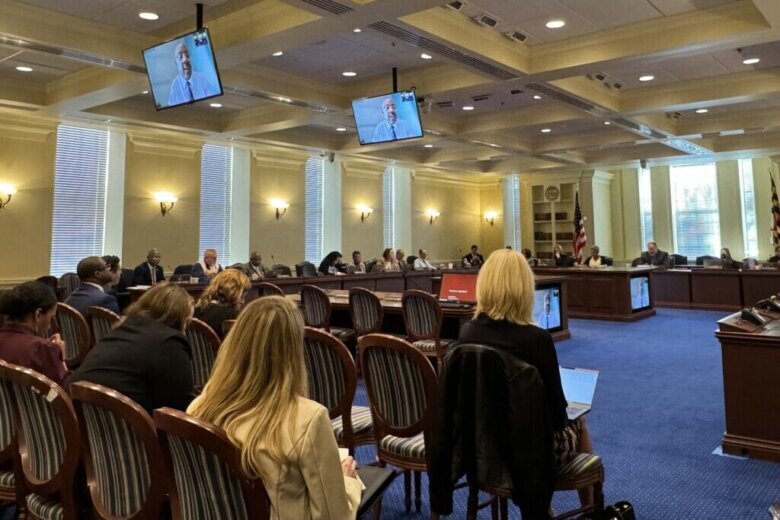This article was republished with permission from WTOP’s news partners at Maryland Matters. Sign up for Maryland Matters’ free email subscription today.

As reforms continue to take effect in Maryland, lawmakers in Annapolis this week debated how to best support the state’s juvenile justice system.
The House Judiciary Committee held a more than three-hour briefing on juvenile justice on Wednesday.
Almost 90 minutes of the discussion focused on comments and questions for Clyde Boatwright, president of the state’s Fraternal Order of Police, who said the union represents more than 20,000 officers in Maryland.
Boatwright, who testified virtually, said one suggestion is “a return to the mandatory detention requests for youth that are accused of violent crimes.”
Children in need
Several lawmakers asked about the process when young people are arrested for an alleged crime.
Some lawmakers and law enforcement personnel have expressed concern about juveniles who are repeatedly arrested for the same crimes.
The legislature passed House Bill 459 – Juvenile Justice Reform last year, which says children under 13 years of age “may not be charged with a crime,” unless it’s a violent offense.
Boatwright said other reforms — such as Senate Bill 53 – Child Interrogation Protection Act, which requires a law enforcement officer who takes a child into custody to “provide reasonable notice to a child’s parent, guardian, or custodian” — have hampered law enforcement’s ability to investigate crimes. Some state’s attorneys have made similar complaints.
In some cases, youth may cycle through the juvenile justice system because they aren’t receiving mental health, counseling and other services.
There is a legal process in the state for Children In Need of Supervision, which allows members of law enforcement, various agencies and residents to fill out a form for young people and their families to receive a variety of services. The process, also known as “CINS,” is overseen by the state Department of Juvenile Services (DJS).
Boatwright said officers don’t fill out the CINS forms because there’s no remedy when a young person continues to commit certain crimes.
“Think about the pressure to check every box to ensure you’re not the person in handcuffs at the end of every encounter,” he said. “Our job is to enforce the law without bias or prejudice.”
However, Del. Charlotte Crutchfield (D-Montgomery) said law enforcement agencies could do more to help young offenders. She said only one child supervision form has been filled out by a Montgomery County police officer in more than six years.
“Why is there so much resistance in helping young people by filing petitions, by doing anything that could help a child?” she said.
“I don’t think it is a resistance,” said Boatwright, who added it’s about educating officers to inform them the CINS option is available.
Crutchfield asked Boatwright, as leader of the FOP, if he would recommend that law enforcement officials use the referral as another option to help youths.
“It’s something I would like to look at. We want as many tools as we can have in the toolbox,” Boatwright said. “We don’t want juveniles locked up doing time. Juveniles that are accused of a crime need services. Adults that are accused of a crime need to be held accountable and need to be sent to jail. That’s a strong position.”
Del. Luke Clippinger (D-Baltimore City), who chairs the Judiciary Committee, said the intake process managed by the Department of Juvenile Services needs to be assessed.
Juvenile services intake officers can determine whether a youth can go home with a family member or guardian, should receive additional services. They also can determine whether to close a case or file a petition to juvenile court.
“There needs to be another look at the tool that’s being used by the department to determine whether juveniles who are coming back again and again are triggering anything within the department to say, ‘Hey, wait a minute. This is somebody who has come back multiple times over a short period of time,’” Clippinger said.
‘Should have been detained’
Boatwright said officers inform juvenile services to determine whether an arrestee is required to be on home detention, has any current or past offenses and whether they are enrolled in a diversionary program. He said that’s one of the ways to see if the child can be released back home.
Del. Aaron Kaufman (D-Montgomery) said some youths aren’t versed in local and state laws, but they know they want to get back home.
“I have a hard time believing that [youths] know the intricacies of American law,” he said.
But they “know the basics and understand right from wrong,” Boatwright said.
The Department of Juvenile Services was a focus in a recent letter signed by Baltimore City Councilmember Zeke Cohen (D), who posted a letter Saturday on his Facebook page and expressed his frustration that two juveniles who were arrested Nov. 1 by a city police officer, after they were alleged to have assaulted and robbed a city resident, were released just hours later.
The letter, addressed to Vincent Schiraldi, secretary of the Department of Juvenile Services, and Baltimore Police Commissioner Richard Worley, said that the suspects were allowed to return home just hours after the assault — in apparent conflict with state law — and that a police report was submitted to DJS the next day.
The letter was also signed by state Democratic lawmakers who represent legislative District 46 — Sen. President Bill Ferguson (D), Clippinger and Dels. Mark Edelson and Robbyn Lewis.
“These two young people committed violent offenses,” according to the letter. “Existing law is clear: they should have been detained and assessed in our juvenile system; they should not have found themselves at home several hours after committing a violent robbery and assault.”
The Baltimore Police Department said in a statement Saturday that officers followed protocol and were praised for quickly apprehending the two suspects.
“While we agree the suspects should have been held in custody in order to protect the public, BPD was not responsible for the release of these individuals,” according to the police. “We must come together to honestly and openly discuss whether process, policy and/or legislative updates could ensure better outcomes for our residents.”
Eric Solomon, spokesperson for DJS, said in an email Wednesday that the agency doesn’t comment on specific cases due to confidentiality laws. He said the notion that the decision was strictly made by the department “may not be accurate and may not fully take into consideration how the system works and various stakeholders’ roles in decisions that are made as to how youth are handled at different points in the system.”
“DJS also takes any suggestions of failure to follow law, policy, or procedure seriously and conducts reviews of all such matters, and cannot comment while an investigation is being conducted,” Solomon said. “We are continually examining and improving services to our young people to keep them and their communities safe, striving to be, as Governor Moore has said, ‘data-driven and heart-led.’”
Juvenile Services released a report in September that showed juvenile complaints have declined over the past decade.
In fiscal year 2014, there were 25,000 juvenile complaints – including crimes of violence, non-violent felonies, misdemeanors and status offenses. That decreased to 7,100 in fiscal year 2021, the height of the pandemic, and increased to 12,363 last fiscal year.
Between 2013 and 2020, according to DJS, youth arrests declined by 63%.
‘We’re failing’
The committee also heard a presentation from Nick Moroney, director of the Juvenile Justice Monitoring Unit, an independent agency within the state attorney general’s office that assesses youth programming, and conducts announced and unannounced inspections and visits to facilities.
Moroney said the legislature should support the juvenile services department by providing resources for health, education and other programs in underserved communities.
“Those [DJS] clients live in those under-sourced neighborhoods,” said Moroney, who added that having youth reside in detention centers that are not within the vicinity of their homes “is not a recipe that helps the kids towards success.”
Del. Robin Grammer Jr. (R-Baltimore County) said the juvenile services department hasn’t been effective, especially when the same youths are arrested for the same or more dangerous offenses.
“Just from the examples that people give me in the community, and they can tell me names and where these youth live, I think we’re failing when a youth continues to escalate their conduct,” he said. “Unequivocally, the state is failing on these children.”
Alice Wilkerson, executive director with Advance Maryland, said the briefing missed a key element: youth and their parents.
“While the Judiciary Committee and its leadership should be commended for focusing on youth justice, we still need to hear from those closest to this issue,” Wilkerson said in a statement. “Any discussion of juvenile justice policy in Maryland must include perspectives of youth and families of youth who have had, or are at risk of having, contact with the system — particularly youth of color.”








